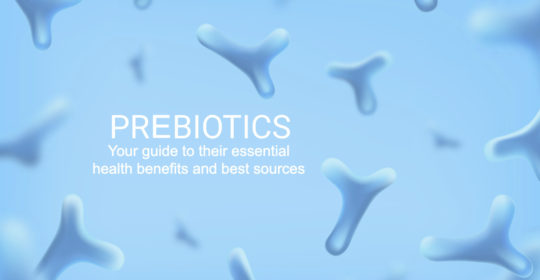
What are prebiotics? Your guide to their benefits and best sources
Trust your gut. This is something we all strive to do, but keeping your gut healthy is another issue altogether. With the recent and growing belief that good overall health starts in the gut, you’ve likely heard about the importance of maintaining the health of your gut microbiome and the role probiotics play in it. It’s less likely, however, that you have heard about prebiotics and their role. While the words look similar the two play different, but equally important, roles in the health of your gut microbiome. The study of prebiotics and the positive effects they have on your health is newer than that of probiotics and theirs, so we have answered a few basic questions for you about prebiotics, what they do and why you should be sure you’re getting them.
What are prebiotics?
Prebiotics are plant fibers that the human body can’t digest, but the beneficial bacteria (probiotics) in your gut eat them. In short, prebiotics are food for probiotics and stimulate the growth of healthy bacteria in the gut. The most common types of prebiotics are: Fructo-oligosaccharides (FOS), galacto-oligosaccharides (GOS), and inulin.
What do prebiotics do?
Prebiotics help beneficial microbes and bacteria that occur in your gut naturally to grow. Your body can’t digest prebiotics so they pass through the digestive system and become food for probiotics. In stimulating the growth of good bacteria in the gut, prebiotics in turn hinder the growth of harmful bacteria.
What are the health benefits of prebiotics?
As stated before, prebiotics stimulate the growth of good bacteria and microbes in the gut, mainly of bifidobacteria and lactobacillus, and this stimulus leads to improved digestion and a stronger immune system. When prebiotic fermentation occurs, short-chain fatty acids (SCFA) are formed. SCFA’s are integral in the modulation of the intestinal barrier and also work to regulate your bodies inflammatory response and immune system and to lower cholesterol.
One of the most common SCFA’s formed is butyrate, which is known to stimulate the cells in our gut promoting regular bowel movements and reducing constipation. Butyrate also strengthens the lining of the gut aiding in nutrient absorption and good digestion.
Prebiotics have also been shown to stimulate metabolism and aid in weight loss. Just as prebiotics stimulate the growth of good bacteria in the gut, they also stimulate the activity of gut-associated lymphoid tissue (GALT) which reduces the risk of several diseases.
Prebiotics are also thought to help your body absorb certain minerals, especially calcium and magnesium, which positively affect your bones.
Prebiotics are also believed to play an important role in the prevention of colorectal cancer due to their beneficial effect on the colorectal microflora.
From what sources can you get prebiotics?
Prebiotics from food
As with most things that are beneficial to your health and well-being, you can get almost all of the prebiotics you need from what you eat.
It’s important to keep in mind that while prebiotics are fibers, this does not mean that all fibers are prebiotic. They are found in many high-fiber foods like whole grains, fruits and vegetables.
It’s important to eat a variety of prebiotics because different types are food for different strains of good gut bacteria. The more diversity you get in prebiotics the more benefit you will see in your health.
Foods that are rich in prebiotics include:
- Garlic.
- Leeks and onions.
- Bananas.
- Berries.
- Oats.
- Flaxseed.
- Asparagus.
- Chicory root.
- Dandelion greens.
- Jerusalem artichokes.
- Peas.
- Beans.
- Legumes.
A search of prebiotic foods or a conversation with a registered dietician can provide you with a complete list and get you started on incorporating them into your diet. In order to get the most benefit from these foods you should consume them raw whenever possible as cooking them may alter their fiber content.
Prebiotics from supplements
If you have dietary restrictions or aren’t able to consume enough of these prebiotic-rich foods, you can also get them from supplements.
Just as it is important to vary your diet in order to get the various types of prebiotics, a supplement should also contain several types of prebiotics since they are food for good bacteria and different bacteria have different diets.
Prebiotics also need probiotics, so you may want to consider a synbiotic supplement. These type of supplements match the prebiotic with the bacteria that feeds on it. Either way, you should make sure that your supplement has two or more different prebiotics.
It is recommended that you avoid chewable prebiotic supplements because they won’t survive your stomach acid, so look instead for acid-resistant capsules.
Leave a reply →
